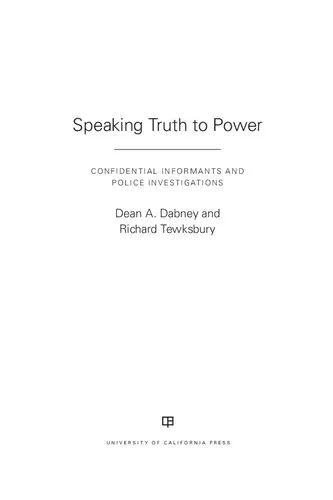Speaking Truth to Power: Confidential Informants and Police Investigations
4.5
Reviews from our users

You Can Ask your questions from this book's AI after Login
Each download or ask from book AI costs 2 points. To earn more free points, please visit the Points Guide Page and complete some valuable actions.Introduction to 'Speaking Truth to Power: Confidential Informants and Police Investigations'
Policing in modern society is often shrouded in secrecy and complexity, balancing numerous ethical and practical challenges. In this multifaceted landscape, confidential informants play a critical but often misunderstood role in law enforcement investigations. The book 'Speaking Truth to Power: Confidential Informants and Police Investigations', authored by Dean A. Dabney and Richard Tewksbury, offers an in-depth exploration into this delicate yet highly significant aspect of police work. By peeling back the layers of this controversial investigative tool, the authors provide a well-rounded perspective into the lives of informants, the decisions of police officers, and the broader societal implications of such practices.
This compelling work is a detailed examination of how law enforcement uses, manages, and often grapples with trust and accountability in cases involving confidential informants. Drawing on extensive research, the book delves into themes of ethics, discretion, and policy in law enforcement, while also offering real-world anecdotes that emphasize both the power and pitfalls of working with informants. With its sharp narrative and unprecedented insights, the book seeks to unveil the untold stories lying at the heart of police investigations, challenging readers to confront uncomfortable questions about justice, power, and truth.
Detailed Summary of the Book
'Speaking Truth to Power' examines the delicate and often contentious role of confidential informants (CIs) in modern policing. The authors begin by laying the foundation, exploring the historical use of informants in law enforcement and how their roles have evolved over time. A central focus of the book is on the relationships between CIs and police officers—relationships that are often fraught with mistrust, manipulation, and ethical dilemmas.
Through interviews with law enforcement personnel and informants, the authors highlight the human side of undercover investigations. They explore why individuals agree to become informants, the pressures they face, and how these partnerships affect their lives. The book sheds light on the complex systems of exchange between informants and police officers, where favors, benefits, and trust are currency.
The narrative also dives into the contentious debates surrounding the use of informants. Topics like accountability, misuse of power, exploitation, and the gray areas of legality and morality come under scrutiny. By providing case studies, the authors do not shy away from presenting how law enforcement's reliance on CIs can either lead to groundbreaking investigative breakthroughs or glaring miscarriages of justice.
Lastly, the book doesn’t just critique; it also offers constructive insights into reforming policies, promoting accountability, and fostering ethical practices within police departments. It is a balanced, research-driven exploration designed to provoke thought and incite meaningful change.
Key Takeaways
- Confidential informants play a crucial yet controversial role in police investigations, providing key information that can either make or break a case.
- The relationships between police officers and informants are complex, driven by motives that range from self-preservation to professional necessity.
- Law enforcement's reliance on informants raises questions of trust, ethics, and systemic accountability.
- While informants can serve the greater good, their usage often blurs the line between justice and exploitation.
- The book underscores the urgent need for transparent policies and better oversight of informant operations to ensure fairness and ethical compliance.
Famous Quotes from the Book
"Truth is never simple; it is a patchwork quilt of perspectives, motives, and consequences."
"In the world of informants, loyalty is currency, but trust is a rare commodity."
"Policing is a balancing act of power—a struggle between solving crimes and safeguarding integrity."
Why This Book Matters
The relevance of 'Speaking Truth to Power' extends beyond academic and law enforcement circles. In today’s climate of heightened public scrutiny of law enforcement practices, this book is more vital than ever. By focusing on the largely hidden world of confidential informants, the authors challenge readers to consider the delicate balance between obtaining justice and upholding ethical standards.
This book matters because it tackles a subject often left unexamined, offering readers the opportunity to understand the complexities of policing from a different angle. It empowers law enforcement professionals, policymakers, and the general public to question the status quo and push for greater transparency and fairness in investigative practices. Furthermore, it sheds light on the human cost of law enforcement decisions—both for officers and informants—prompting broader discussions about systemic reforms.
Ultimately, 'Speaking Truth to Power' encourages us to interrogate the relationship between truth, power, and justice, making it a transformative read for anyone invested in the pursuit of fairness and accountability.
Free Direct Download
You Can Download this book after Login
Accessing books through legal platforms and public libraries not only supports the rights of authors and publishers but also contributes to the sustainability of reading culture. Before downloading, please take a moment to consider these options.
Find this book on other platforms:
WorldCat helps you find books in libraries worldwide.
See ratings, reviews, and discussions on Goodreads.
Find and buy rare or used books on AbeBooks.
1188
بازدید4.5
امتیاز50
نظر98%
رضایتReviews:
4.5
Based on 0 users review
"کیفیت چاپ عالی بود، خیلی راضیام"
Questions & Answers
Ask questions about this book or help others by answering
No questions yet. Be the first to ask!


